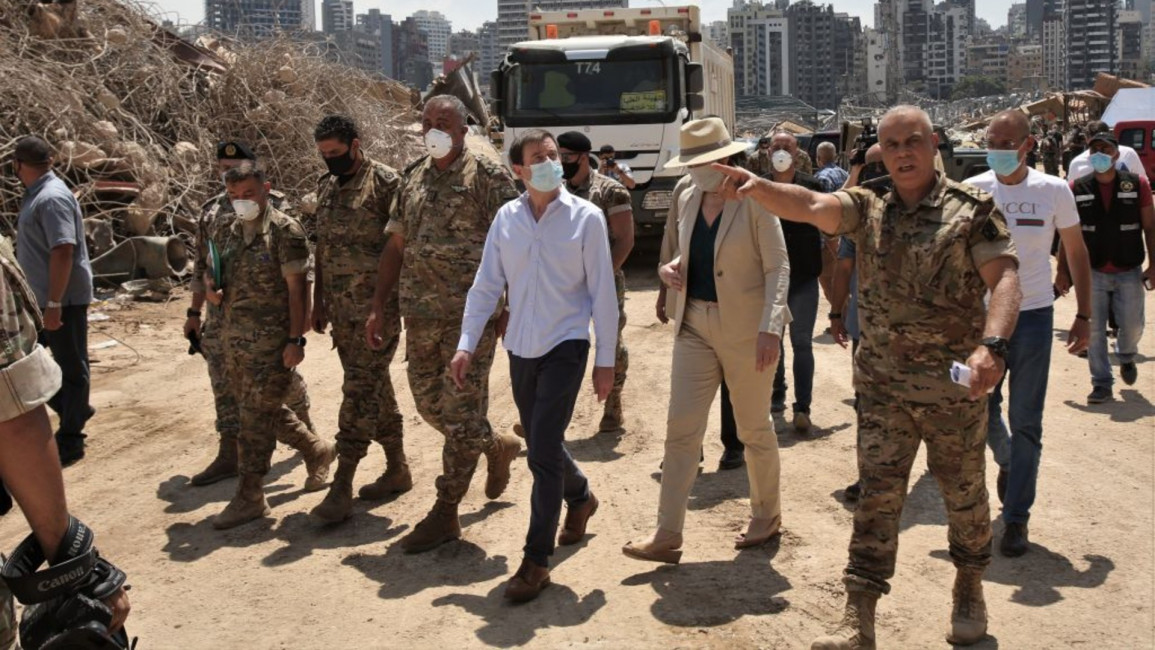Follow us on Facebook, Twitter and Instagram to stay connected
'Rock bottom' Lebanon must tackle corruption to receive post-blast aid: US
A leading US official has demanded Lebanon's leadership enact major political reforms in order to receive aid from Washington, after an inspection of a blast site in Beirut which led to huge swathes of the capital being destroyed on 4 August.
US Under Secretary of State for Political Affairs David Hale spoke to reporters close to the crater caused by the explosion of stockpile of ammonium nitrate at Beirut's port earlier this month that killed 172 people.
The devastating blast destroyed the port and neighbouring areas, made 300,000 Lebanese homeless, and caused billions of dollars of damage.
As the Lebanese government makes appeals for cash to help with reconstruction, Hale said that the country's unpopular leadership must enact substantial reforms in order to receive aid from the US.
"They (the Lebanese people) see rulers who use the system in order to enrich themselves and to ignore popular demands," Hale said, according to Reuters.
|
|
"That era is over. There is no more money for that. They are at rock bottom and sooner or later, I believe, that the leadership will appreciate the fact that it is time to change. And if not, I am convinced that the public will increase the pressure on them."
The explosive material that led to the blast had been sitting in the port for years with blame and counter-blame volleying among Lebanon's leadership and port officials.
The explosion and failure to accept responsibility has further fueled anger at the country's entrenched leadership, many of whom have remained powerful and wealthy figures in Lebanon since the civil war in the 1970s and 1980s.
While Lebanese have demanded the fall of the government and a new form of inclusive politics, the US official called for economic reforms, while addressing widespread grievances about corruption and transparency issues.
"What happened at the port (is) bad enough, but in many ways it's symptomatic of larger problems in Lebanon," Hale added.
"We can't fix that from the outside. Lebanese leaders have to demonstrate the political will and the commitment to do that and that was my main message."
Another concern for the US in Lebanon is Hezbollah's influence and powerful role in government, a movement considered by many Lebanese as part of the corrupt political class.
"Reforms are contrary to the interests of all the status quo leaders and that very much includes Hezbollah, which today is perceived as a big part of the problem," Hale said.
Lebanese have held mass protests against the government about the dire economic situation in the country, which has seen inflation spiral and savings lost.
The unrest led to the downfall of former Prime Minister Saad Hariri's government in October, while the new administration - headed by Hassan Diab - resigned over the blast.
President Michel Aoun, another former civil war figure, also remains in his post, while activists are concerned the political malaise will continue unless the status quo is broken.


![President Pezeshkian has denounced Israel's attacks on Lebanon [Getty]](/sites/default/files/styles/image_684x385/public/2173482924.jpeg?h=a5f2f23a&itok=q3evVtko)



 Follow the Middle East's top stories in English at The New Arab on Google News
Follow the Middle East's top stories in English at The New Arab on Google News


